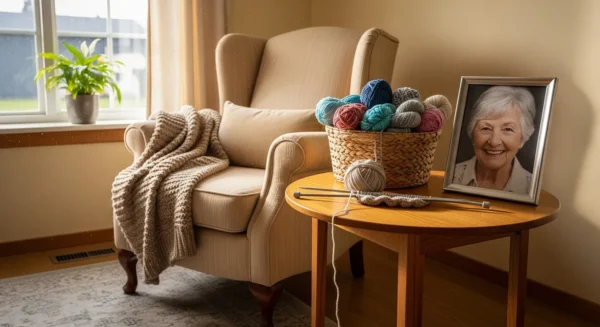
Introduction: Prioritizing Your Well-Being While Coping With Grief
Losing a spouse is one of the most profound and painful experiences a person can endure. Your life partner, the person with whom you have shared countless moments, memories, and daily routines, is gone. The silence in your home can feel deafening, and the future you had planned together is suddenly and irrevocably changed. In the midst of this overwhelming sorrow, it is important to remember that your own health and well-being require gentle and consistent attention. This is not a sign of forgetting your loved one, but rather a way of honoring the life you still have to live.
Grief is not a problem to be solved; it is a natural, albeit deeply painful, response to loss. For seniors, navigating this journey comes with its own unique set of challenges. You may be coping with your own health concerns, a smaller social circle, or financial worries. The process of emotional healing is not linear, and there is no right or wrong way to grieve. However, by understanding how grief affects you and by taking small, deliberate steps to care for yourself, you can protect your health and find a path toward a new sense of peace and purpose. This article aims to provide a compassionate guide to help you through this difficult time, offering practical bereavement tips and emphasizing the importance of seeking professional support when needed.

Understanding the Impact of Grief on Your Health
The experience of grief is not confined to our emotions; it is a whole-body process that can have significant effects on our physical and mental health. When you are grieving, your body is under an immense amount of stress, which can manifest in ways you might not expect. Understanding these potential impacts is the first step in taking proactive measures to protect yourself.
Physically, intense grief can weaken the immune system, making you more susceptible to colds, the flu, and other infections. It is common for grieving individuals to experience changes in appetite, leading to either weight loss or gain. Sleep is also frequently disrupted. You might find it difficult to fall asleep, wake up frequently during the night, or feel exhausted even after a full night’s rest. This lack of restorative sleep can worsen feelings of fatigue and emotional distress.
In some cases, the emotional shock of losing a loved one can lead to a condition called takotsubo cardiomyopathy, often referred to as “broken heart syndrome.” This is a temporary heart condition where extreme stress causes a part of the heart to enlarge and not pump well. While it is usually temporary, it requires immediate medical attention. More commonly, the chronic stress associated with bereavement can exacerbate existing health conditions like high blood pressure, heart disease, or diabetes. It’s not unusual to experience physical symptoms like headaches, digestive issues, or an increase in aches and pains.
Mentally and emotionally, grief can lead to a wide range of feelings including profound sadness, anger, guilt, and deep loneliness. You might experience brain fog, finding it hard to concentrate or remember things. For some, grief can develop into more serious conditions like complicated grief, where the feelings of loss are debilitating and do not improve over time, or clinical depression. It is essential to recognize that these are not signs of weakness but are serious health risks that require compassionate care and professional intervention.

A Gentle Guide to Navigating Your Grief
Navigating the journey of grief is deeply personal, and it is important to be patient and kind to yourself. There is no timeline for healing, and your path will be your own. The following steps are gentle suggestions, not a rigid checklist. Think of them as tools you can use to support your well-being as you move through this challenging time.

Step 1: Allow Yourself to Feel Without Judgment
The first and most crucial step is to give yourself permission to feel whatever emotions arise. You may feel deep sadness, which is expected. But you might also feel anger—at your spouse for leaving, at the illness that took them, or at the world. You might feel guilt over things you did or didn’t say. You may even feel moments of relief, especially if your spouse had a long and difficult illness. All of these feelings are normal parts of the grieving process. Do not judge yourself for having them. Acknowledging your emotions without trying to suppress them is a vital part of emotional healing. Crying is a natural and healthy release; allow yourself to cry when you need to.

Step 2: Prioritize Your Basic Physical Needs
When you are emotionally overwhelmed, it is easy to neglect your physical health. However, your body needs care now more than ever. Focus on three simple things:
- Nutrition: You may not have an appetite, but your body still needs fuel. Try to eat small, regular meals throughout the day rather than forcing large ones. Focus on simple, nourishing foods like soup, yogurt, fruit, or toast. If cooking feels like too much, do not hesitate to accept offers of meals from friends and family or consider a meal delivery service.
- Hydration: Dehydration can worsen fatigue and brain fog. Keep a glass of water nearby and sip it throughout the day.
- Gentle Movement: You do not need to engage in strenuous exercise. A short, slow walk around your block each day can do wonders. It gets you out in the fresh air, exposes you to sunlight, and releases endorphins that can gently lift your mood. Always consult your doctor before starting any new physical activity.

Step 3: Lean on Your Support System
Isolation can make grief much harder to bear. It is important to connect with others, even when it feels difficult. Reach out to trusted family members or friends who are good listeners. Let them know what you need, whether it is someone to sit with you in silence, help with errands, or just listen as you share memories. Consider joining a senior support group for widows and widowers. Being with others who truly understand what you are going through can be incredibly validating and comforting. Your local senior center, place of worship, or hospital may offer bereavement support groups.

Step 4: Create New, Simple Routines
The loss of a spouse means the loss of shared routines that have structured your days, perhaps for decades. The empty chair at the breakfast table or the quiet of the evening can be particularly painful. Creating new, simple routines can provide a sense of stability and purpose. It does not have to be complicated. It could be something as small as reading the newspaper with a cup of tea every morning, taking a walk at the same time each afternoon, or calling a friend every evening. These small anchors can help structure your day and give you something to hold onto when you feel adrift.

Step 5: Find Ways to Honor and Remember
Finding ways to remember your spouse can be a comforting part of the healing process. This is not about living in the past but about integrating their memory into your present life in a healthy way. You might create a memory box with cherished photos and mementos. You could plant a tree or a garden in their honor. Perhaps you could continue a hobby or tradition you both enjoyed, or make a donation to a charity they cared about. These acts of remembrance can provide a sense of continued connection and help you celebrate the love you shared.

Key Signs It’s Time to Consult a Doctor
While grief is a normal process, there are times when it can become overwhelming and negatively impact your health in a serious way. It is crucial to recognize the signs that indicate you need professional help. Your well-being is the priority, and seeking help is a sign of strength, not weakness. Please consult your doctor or a mental health professional immediately if you experience any of the following:
- Thoughts of harming yourself: If you are having thoughts of suicide or that life is not worth living, please seek help immediately. You can call or text the 988 Suicide & Crisis Lifeline at any time to connect with a trained counselor.
- Inability to perform daily tasks: If weeks have passed and you are still unable to manage basic self-care like bathing, dressing, or preparing simple meals, it is time to see a doctor.
- Intense feelings of guilt or worthlessness: While some guilt can be a normal part of grief, overwhelming feelings that you are worthless or that you could have prevented the death require professional support.
- Lack of improvement over time: While grief has no set timeline, if your intense, debilitating symptoms do not begin to ease at all after several months, you may be experiencing complicated grief, which benefits from professional treatment.
- Significant physical symptoms: If you experience persistent chest pain, shortness of breath, significant and unintentional weight loss or gain, or chronic digestive issues, see your primary care physician to rule out any underlying medical conditions.
- Substance misuse: Using alcohol, prescription medication, or other substances to numb your pain is a dangerous coping mechanism that requires professional intervention.
Your family doctor is an excellent first point of contact. They can assess your physical health and refer you to a therapist, counselor, or psychiatrist who specializes in grief and bereavement.

Integrating Healing Practices into Your Daily Life
Making self-care a consistent part of your routine is key to navigating grief in a healthy way. The goal is to weave small, manageable practices into your daily life that support your emotional and physical well-being. Consistency is more important than intensity.
Consider starting with one or two of these simple ideas:
- Schedule a “Worry Time”: Instead of letting anxiety consume your entire day, set aside 15 minutes each day to allow yourself to sit with your grief and worry. When the time is up, make a conscious effort to shift your focus to something else, like listening to music or working on a puzzle.
- Practice Mindful Moments: You do not need to meditate for hours. Simply take a few moments each day to focus on your breath. Sit comfortably, close your eyes, and take five deep, slow breaths. This can help calm your nervous system when you feel overwhelmed.
- Keep a Simple Journal: You do not have to write pages and pages. At the end of each day, try writing down just one thing you are grateful for, one memory of your spouse that made you smile, or one feeling you experienced. This can be a gentle way to process your emotions.
- Stay Socially Connected: Make it a routine to connect with someone every day. This could be a phone call to a family member, a text to a friend, or a brief chat with a neighbor. This regular, small dose of social connection can combat the profound loneliness that often accompanies loss.
- Engage Your Senses: Find small things that bring you a moment of comfort. It could be the warmth of a cup of tea, the softness of a favorite blanket, the sound of calming music, or the smell of a scented candle. Engaging your senses can help ground you in the present moment.
Remember, the goal is not to “get over” your grief, but to learn to carry it with you as you move forward. These small, daily practices can provide the strength and resilience needed for the journey.

Frequently Asked Questions
1. Is it normal to feel angry at my late spouse?
Yes, it is completely normal to feel anger as part of the grieving process. You may be angry at your spouse for leaving you, for not taking better care of themselves, or for things left unsaid. This anger is often a mask for the deep pain and helplessness you feel. Acknowledging this anger, rather than feeling guilty about it, is an important step. Talking about these feelings with a trusted friend or a grief counselor can be very helpful.
2. My friends seem to think I should be “over it” by now. How should I respond?
It can be hurtful when others, even well-meaning ones, impose their own timeline on your grief. People who have not experienced this type of loss may not understand that healing takes a long time. You can respond gently but firmly. You might say something like, “I appreciate your concern, but I am still working through my grief, and I need to do it at my own pace.” It can be helpful to seek out a senior support group where you will be understood and not judged.
3. How can I possibly get through holidays and anniversaries?
These milestone days can be incredibly difficult. The key is to plan ahead. Do not wait for the day to arrive and hope you will make it through. Decide beforehand how you want to spend the day. You might choose to start a new tradition, visit a place that was special to you both, or spend quiet time with a close friend or family member. It is also perfectly acceptable to give yourself permission to not celebrate at all if it feels too painful. Do what feels right for you.
4. Does Medicare cover grief counseling or other mental health services?
Medicare Part B (Medical Insurance) helps cover mental health services that you get from a healthcare provider outside of a hospital, such as a psychiatrist, clinical psychologist, or clinical social worker. This includes services like individual therapy and grief counseling. Your specific costs can vary depending on your plan. It is always best to confirm your coverage and any potential out-of-pocket costs. Authoritative health information for seniors is provided by the National Institute on Aging (NIA) and the Centers for Disease Control and Prevention (CDC).
For insurance and medical coverage questions, refer to Medicare.gov. For mental health support, consult the National Institute of Mental Health (NIMH).
Disclaimer: This article is for informational purposes only and does not constitute medical advice. The content is not intended to be a substitute for professional medical advice, diagnosis, or treatment. Always seek the advice of your physician or other qualified health provider with any questions you may have regarding a medical condition.
|
Fact-Checked Content
Our editorial team reviews all content for accuracy and updates it regularly. Learn about our editorial process →
|

















